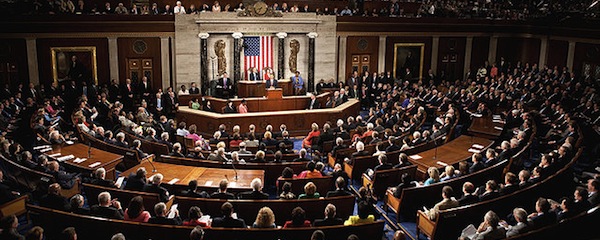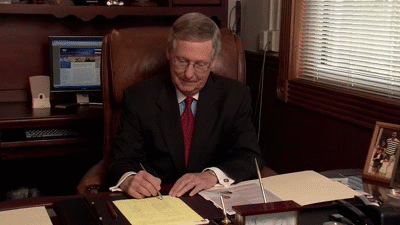The Senate has officially fallen to the Republicans.
At 1:25 AM ET, I’m calling it quits on the updates, since I can’t wait for Alaska or the final Virginia call.
I’ll be updating with notes and observations here as I go tonight. Some won’t be called tonight or will go to runoffs later. Ordered alphabetically (italics = old update) and moved to lower section when called:
– Alaska Senate: This won’t close until very, very late eastern time. Expect delays in counting.
– Added: Virginia Senate: Update 5: With 99.9% counted, Warner is currently squeaking to re-election by about 12,462 votes. || Update 4: Sen. Warner (D) finally edges ahead by a few thousand at 98.6% counted. || Update 3: This is basically coming down to how many more votes Warner can extract from populous Fairfax County, where he leads heavily with almost 40% still to be counted. || Update 2: Looking a little better with Gillespie (R) now under 50% at 90% counted, and I’m told by my DC sources that Warner will squeak by, but it’s going to be incredibly tight. || Update 1: It’s looking a bit more dire to me, overall and at the county level, than it ought to with 75% counted and the Republican leading over Sen. Warner (which was never expected in any polling or projections I saw). The Virginia 2006 Senate results by county, which narrowly delivered a Democratic win by very narrow margins, already don’t match the map tonight, even with Democratic northeastern Virginia still to come.
There are other important and very close races, obviously, all over the place. So these are just my particular picks to watch. If you want to nominate any additions, drop that in the comments! (My night-before predictions on the US Senate side is here.)
I’m using Politico/AP for my data.
Key Senate races already called
– New Hampshire Senate: Sen. Shaheen (D) holds.
– Michigan Senate: Open seat. Democratic hold.
– Kentucky: Sen. Mitch McConnell (R) re-elected. Much ado about nothing.
– Kansas Senate: Update 2: It’s called for Sen. Roberts; Republican hold. Much ado about nothing after all. Update 1: Sen. Roberts (R) picking up steam in the lead, after very early Orman leads.
– Georgia Senate: Update 2: This is called for Perdue (R) and will not go to a runoff, in a bit of a twist; the seat remains in GOP hands… another much ado about nothing race. || Perdue (R) is crushing Nunn (D) in this open R seat race with 71% counted. Expected to go to post-November runoff.
– Iowa Senate: It’s called for Ernst (R); flips to Republicans. Update 2: Ernst (R) edges into the lead and toward the 50% mark in this open D seat after 46.4% counted. || Update 1: Braley (D) off to a good start.
– North Carolina Senate: Tillis wins; Sen. Hagan (D) loses the seat. It’s officially all over for Democrats in the Senate. Update 3: Tillis (R) leading by 47,500ish votes over Sen. Hagan at 95.3% counted. || Update 2: Tillis (R) opens a narrow lead of 30,000ish votes over Sen. Hagan (D) at 79% counted. || Update 1: I predict this is resolved between 12 and 1 AM with less than a half a percentage point separating them, but right now Sen. Hagan (D) has a solid lead at 28% counted.
– Colorado Senate: Update 3: It’s called for Gardner (R) over Sen. Udall (D); flips to Republicans. Update 2: Gardner (R) opening a hefty lead over Sen. Udall (D). || Update 1: Looks incredibly close so far…
– Montana: Open seat. Flips to Republicans.
– West Virginia: Open seat. Flips to Republicans.
– Arkansas: Sen. Pryor defeated, flips to Republicans
– South Dakota Senate: Open seat. Flips to Republicans. Much ado about nothing as Rounds cruises to 51% in a 3 way race.
– Louisiana Senate: This will go to a post-November runoff. D incumbent, unresolved.
GOP gain 7 so far, with no losses of Republican-held seats now possible. Need 6 net wins to capture majority.
Other called races
– Florida Governor: Update 3: It’s called for Gov. Scott (R). Bummer. Update 2: Rick Scott looking like he’s going to hold on for another term with 95% counted but the margin is about 86,000 votes statewide. Update 1: Incumbent Rick Scott (R) leading by over a hundred thousand votes with 81% counted.
– Wisconsin Governor: It’s been called for Gov. Scott Walker (R), his third gubernatorial win in competitive statewide battles.
– Michigan Governor: Gov. Snyder (R) re-elected. Update 1: This is probably going to incumbent Rick Snyder (R).
– Kansas Governor: Update 3: It’s called for Gov. Brownback (R) in a huge and disappointing comeback for his radical agenda. || Update 2: Gov. Brownback (R) now taking a lead with 70.3% counted. || Update 1: Davis off to a good start against toxic incumbent Brownback (R).
– Massachusetts Governor: Update 5: It’s called for Baker (R) by about 26,000ish votes. || Update 4: Baker now back in the lead by about 11,000 at 87.7% counted. || Update 3: 100 vote margin while the United Independent Party guy has over 52,000 votes. Good work, spiteful Democrats and Greens. || Update 2: Coakley surprisingly edging ahead of Baker. Might not be enough to win but this is good news. || Update 1: Baker (R) in the lead by what looks like a narrow but sustainable margin.
– Maine Governor: The Boston Globe has called it for Gov. LePage (R) so I’m going with that, sadly. Update 3: 59.1% counted, LePage (R) leading by 17,650 votes and a few percentage points in this 3-way race. || Update 2: LePage (R) leading by about 14,000 votes at 45.8% counted. || Update 1: Gov LePage (R) up by a few thousand votes at 39.5% counted.







